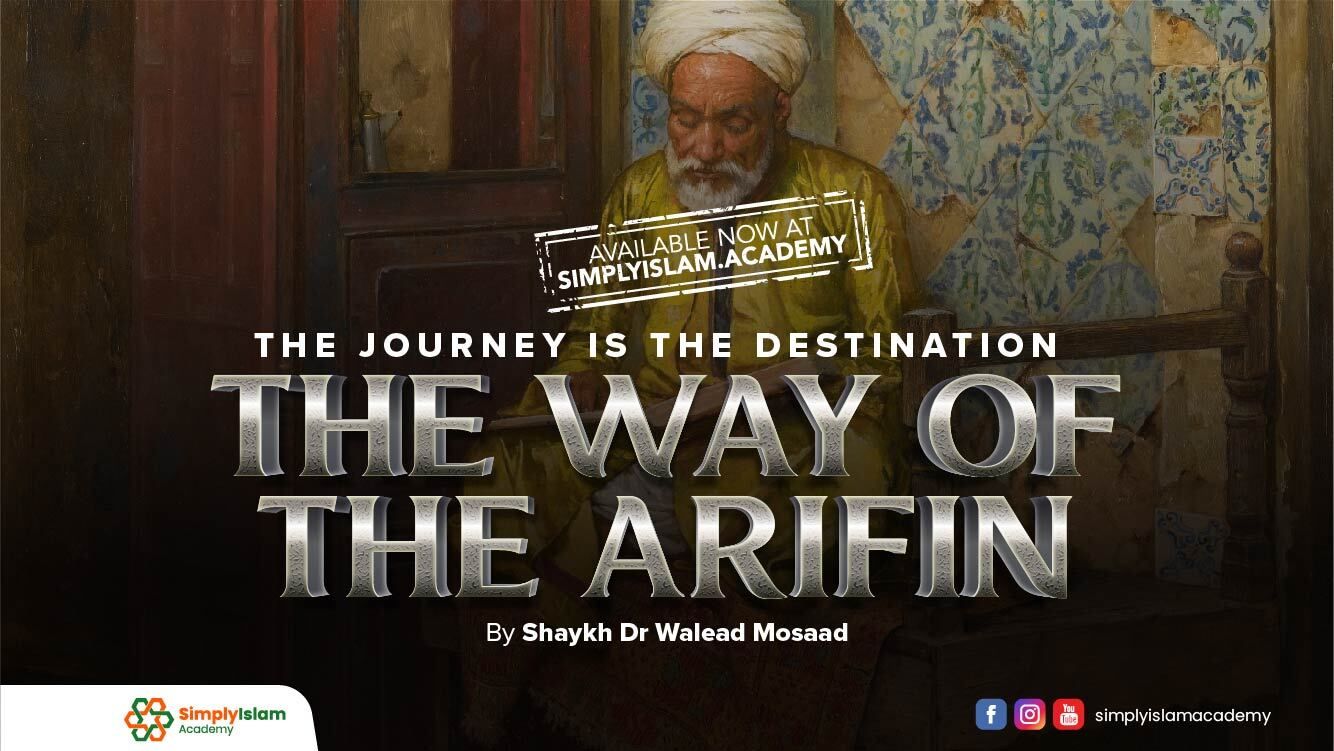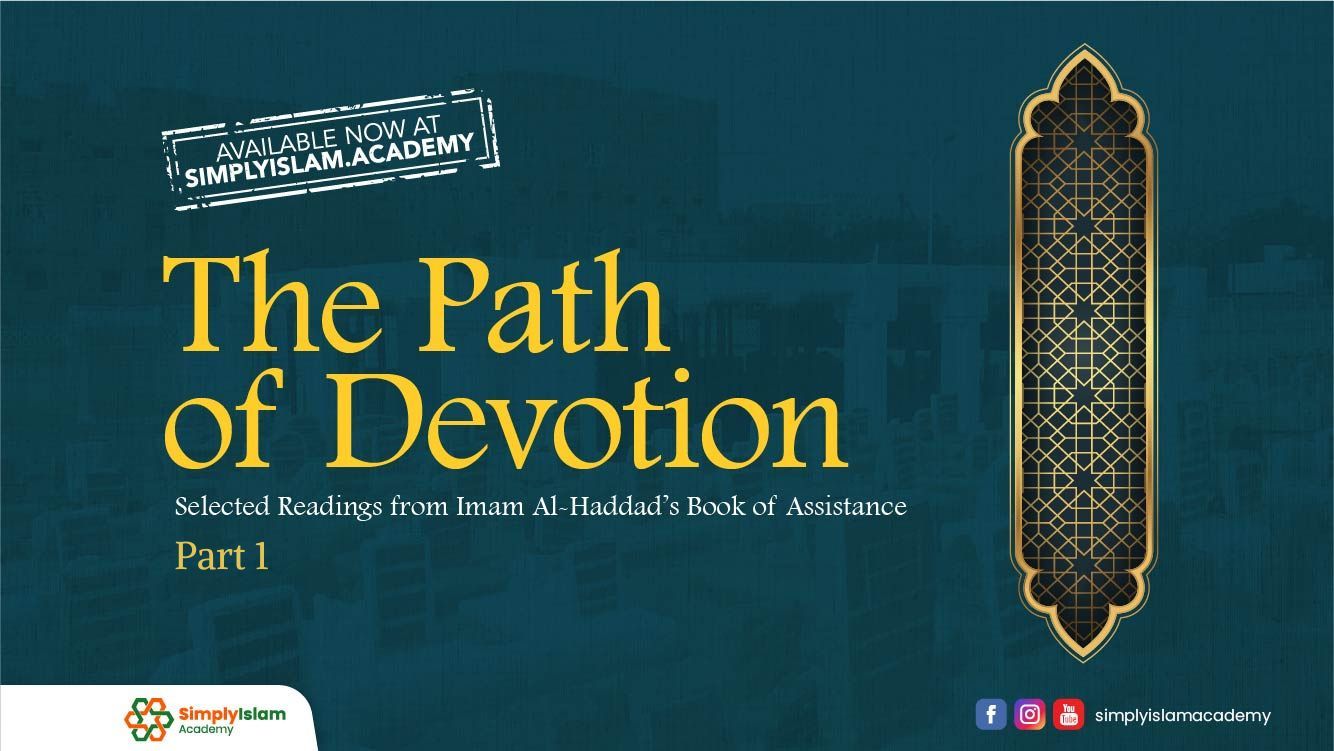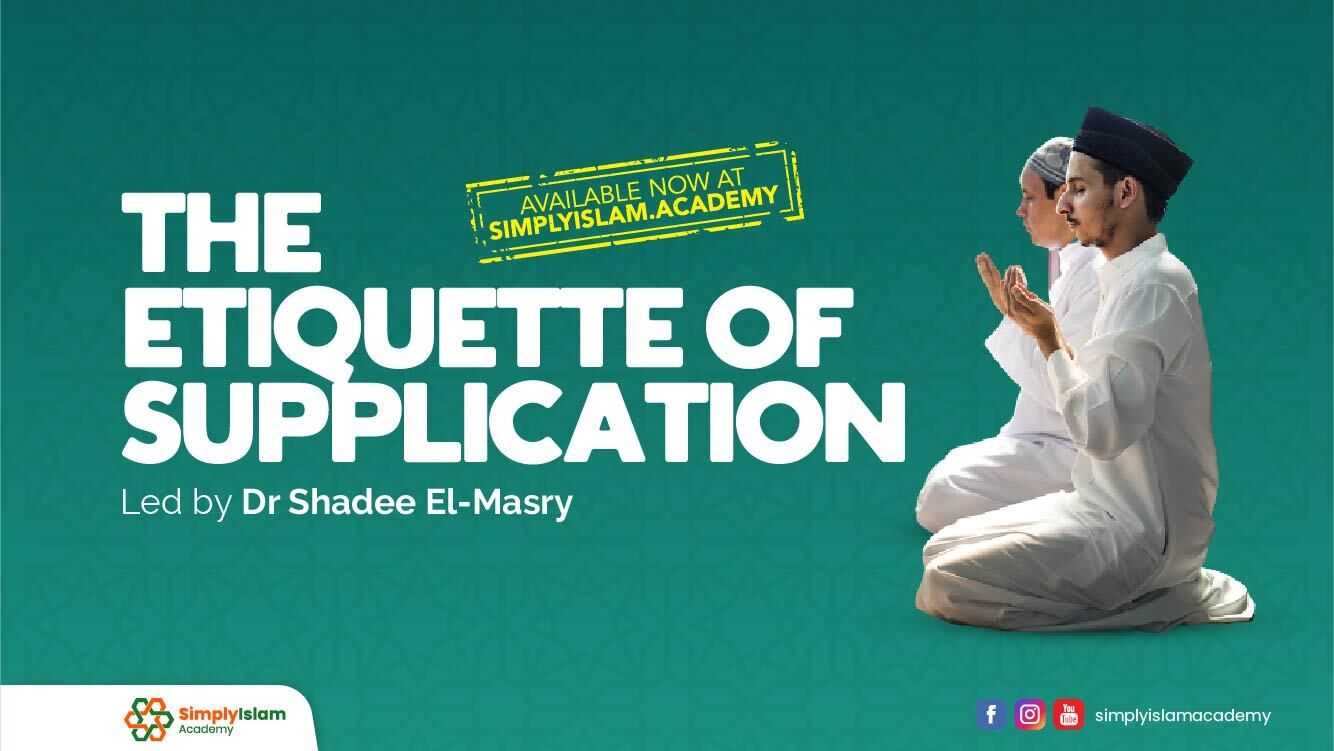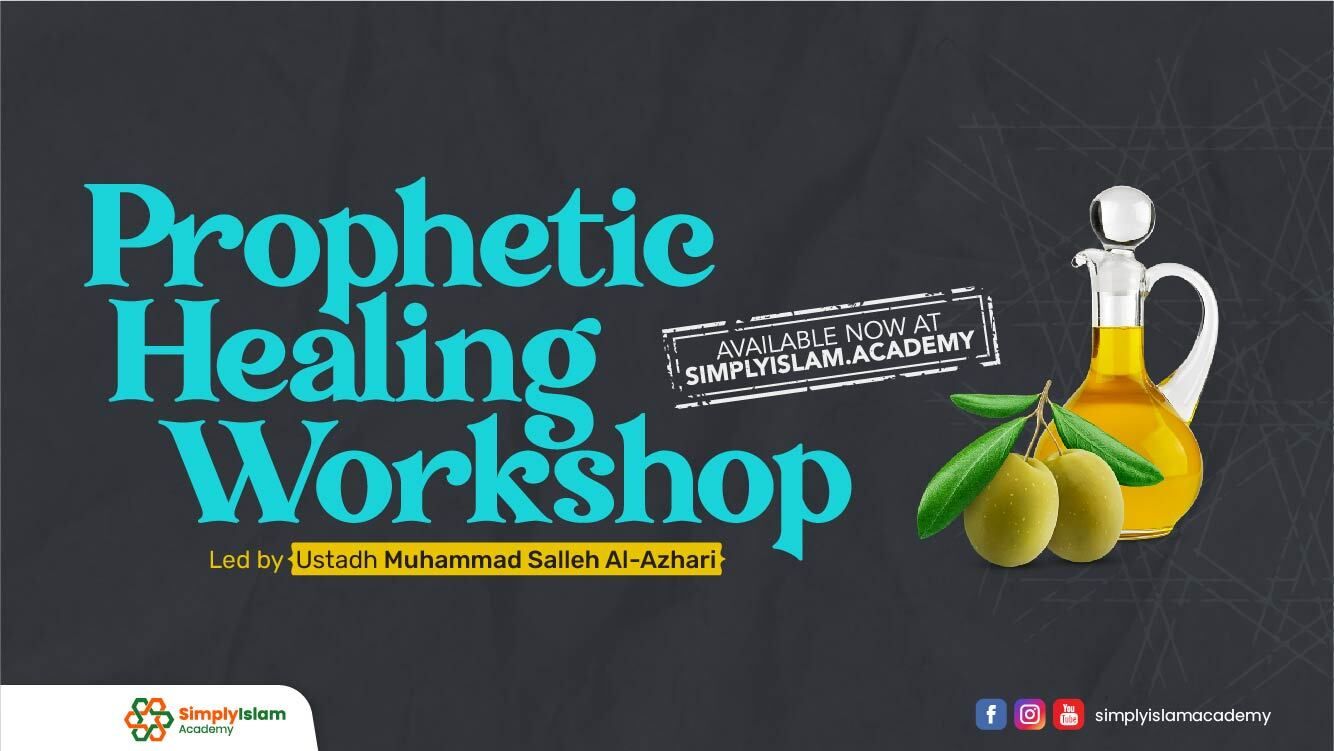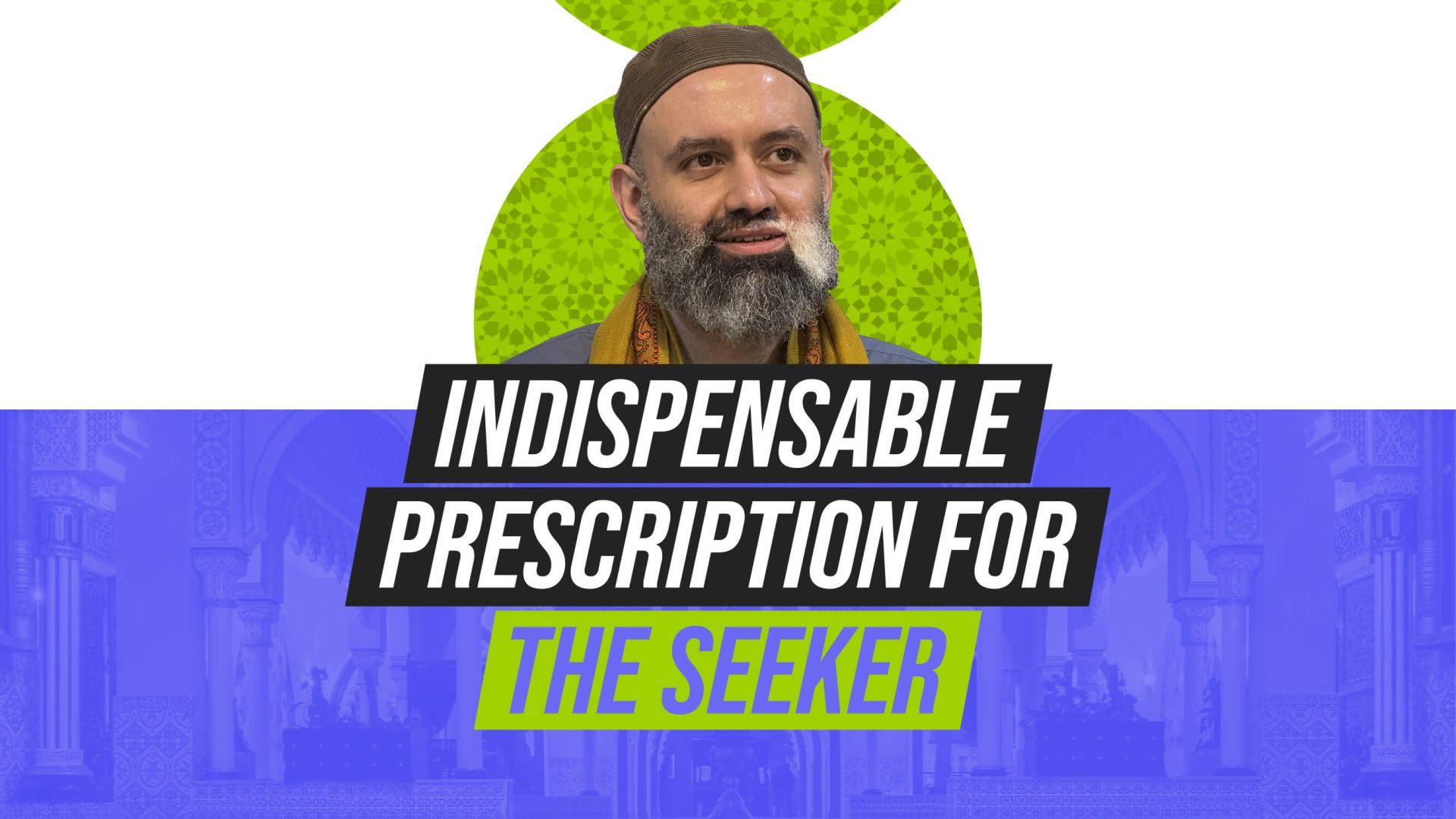How to perform Dhikr – A Virtue of the Arrifin
-
Fatima Sajid
-
08 Nov 2021
Dhikr, or the remembrance of Allah, is a profound act of devotion that nourishes the soul and strengthens our connection with Allah Almighty.
It is a practice deeply rooted in Islam, encompassing the recitation of Quranic verses, supplications, and praises of Allah Almighty. Understanding how to perform dhikr is essential for those who wish to incorporate this spiritual practice into their daily lives. Beyond its simplicity, dhikr carries immense spiritual and emotional benefits, offering solace, tranquility, and a sense of purpose.
This article explores the steps and etiquette of how to do dhikr, ensuring you can engage in this act of worship meaningfully and effectively. Whether you are a beginner or looking to deepen your practice, we will provide practical guidance on how to do dhikr as a regular and impactful part of your routine. By doing so, you can experience its transformative power in your journey toward spiritual fulfillment.
What is Dhikr?
Let’s learn the meaning of dhikr in islam.
The Arabic word ذكر means ‘reminder’ or to ‘remember’. Dhikr meaning in Islam is to remember God using short sentences that contain the names of Allah and/or supplications from the Qur’an or hadith that glorify Allah the Merciful. The concept behind Dhikr is to constantly remember the Greatness of Allah the Merciful while going about our daily lives.
Importance of Dhikr in Islam
Mentioning and praising Allah the Merciful is one of the simplest forms of worship a Muslim can do. It is easy to practice and can be done anywhere, at anytime. Regardless of its ease in performance, Dhikr plays a fundamental role in the life of a believer. While it serves as a reminder and a source of worship, it brings peace and tranquility in our lives.
الَّذينَ آمَنوا وَتَطمَئِنُّ قُلوبُهُم بِذِكرِ اللَّهِ ۗ أَلا بِذِكرِ اللَّهِ تَطمَئِنُّ القُلوبُ
“Those who have faith and whose hearts find peace in the remembrance of God –– truly it is in the remembrance of God that hearts find peace.” [13:28]
The difference between a person who remembers and praises Allah is as stark as the difference between a living and dead thing in the eyes of Allah. The Prophet (Peace and Blessings be upon him) said, "The example of the one who celebrates the Praises of his Lord (Allah) in comparison to the one who does not celebrate the Praises of his Lord, is that of a living creature compared to a dead one." (Bukhari)
The importance of Dhikr is often overlooked but through the hadith we find out that if a person remembers Allah the Merciful by himself, Allah the Merciful remembers him by Himself as well. But if someone remembers Allah in a gathering of people, Allah will remember that person in the presence of angels. The Messenger of Allah (Peace and Blessings be upon him) said, "Allah the Exalted says: 'I am as my slave expects me to be, and I am with him when he remembers Me. If he remembers me inwardly, I will remember him inwardly, and if he remembers Me in an assembly, I will remember him in a better assembly (i.e., in the assembly of angels)." (Bukhari)
Usually we only remember Allah the Merciful when faced with hardships but the best of all example that we have is of the Prophet (Peace and Blessings be upon him), who remembered Allah at all moments in his lifetime whether good or bad. It was narrated by A'ishah (May Allah be pleased with her) that: The Messenger of Allah (Peace and Blessings be upon him) used to remember Allah in all of his affairs. (Tirmidhi)
Why should we perform Dhikr?
Dhikr is a form of worship; one of the easiest to perform and heaviest on the scales on the Day of Judgment. However just like Allah the Merciful doesn’t need our worship; He also does not need our praise. It is us, ourselves who need it and will benefit from it. Allah the All Exalted is praised and worshipped by all of His creations except man.
وَمَا خَلَقْتُ الْجِنَّ وَالْإِنْسَ إِلَّا لِيَعْبُدُونِ مَا أُرِيدُ مِنْهُمْ مِنْ رِزْقٍ وَمَا أُرِيدُ أَنْ يُطْعِمُونِ إِنَّ اللَّهَ هُوَ الرَّزَّاقُ ذُو الْقُوَّةِ الْمَتِينُ
“I created jinn and mankind only to worship Me I want no provision from them, nor do I want them to feed Me God is the Provider, the Lord of Power, the Ever Mighty.” [51:56-58]
Allah alone is the master and creator of the entire universe. Everything in the heavens and earth, glorifies and praises him in their own language and way.
تُسَبِّحُ لَهُ السَّماواتُ السَّبعُ وَالأَرضُ وَمَن فيهِنَّ ۚ وَإِن مِن شَيءٍ إِلّا يُسَبِّحُ بِحَمدِهِ وَلٰكِن لا تَفقَهونَ تَسبيحَهُم ۗ إِنَّهُ كانَ حَليمًا غَفورًا
“The seven heavens and the earth and everyone in them glorify Him. There is not a single thing that does not celebrate His praise, though you do not understand their praise: He is most forbearing, most forgiving.” [17:44].
We find out that all animals like birds and ants also praise Allah the Merciful from the following hadith.
Abu Hurairah (May Allah be pleased with him) reported: The Messenger of Allah, (Peace and Blessings be upon him), said, “An ant had bitten a prophet among the prophets, so he ordered that the ant colony should be burned. Allah revealed to him: because one ant has bitten you, you have destroyed a nation among the nations which glorify Allah.” [Sahih Muslim]
Even the clouds glorify Allah by thunder.
وَيُسَبِّحُ الرَّعدُ بِحَمدِهِ وَالمَلائِكَةُ مِن خيفَتِهِ وَيُرسِلُ الصَّواعِقَ فَيُصيبُ بِها مَن يَشاءُ وَهُم يُجادِلونَ فِي اللَّهِ وَهُوَ شَديدُ المِحالِ
“The thunder sounds His praises, as do the angels in awe of Him; He sends thunderbolts to strike whoever He will. Yet still they dispute about God –– He has mighty plans.” [Quran 13:13]
This helps a wise person to realize the importance of Dhikr. Surely if all of His creations are constantly remembering Him, then His Oneness and Greatness is not affected by our remembrance of Him. But it serves as a reminder to the believers about the supremacy of Allah the Merciful and how everything is under His sovereign.
How to do Dhikr?
There are many ways to do Dhikr and we will discuss those methods in the following paragraphs. Keep reading to know the examples of dhikr.
1. Reading the Qur’an
Ultimately, the best form of remembrance is reading the Book of Allah. The Qur’an not only serves as a way of remembering God but also reminds us of the principles that Allah the Merciful has ordained for us. The Quran will also intercede of behalf of the reader on the Day of Judgment.
Abu Umaamah al-Baahili says,
“I heard the Messenger of Allah (Peace and Blessings be upon him) say: “Read the Quran, for it will come on the Day of Resurrection interceding for its companions.”
– Muslim
– Muslim
Just reciting one letter of the Holy Book equals to ten rewards.
Muhammad bin Ka'b Al-Qurazi is reported to have said: "I heard 'Abdullah bin Mas'ud saying: 'The Messenger of Allah (Peace and Blessings be upon him) said: "[Whoever recites a letter] from Allah's Book, then he receives the reward from it, and the reward of ten the like of it. I do not say that Alif Lam Mim is a letter, but Alif is a letter, Lam is a letter and Mim is a letter. [Tirmidhi]
If a person struggles to recite the Book of Allah; they receive twice the reward of a person who can recite it fluently. The reward is doubled because the first person continues to read the Qur’an despite it being difficult for them. It was narrated by Aisha (May Allah be pleased with her):
The Prophet (Peace and Blessings be upon him) said, "Such a person as recites the Qur'an and masters it by heart, will be with the noble righteous scribes (in Heaven). And such a person exerts himself to learn the Qur'an by heart, and recites it with great difficulty, will have a double reward." [Bukhari]
2. SubhanAllah or SubhanAllah wa bihamdihi
Subhan Allah means Allah the Merciful is free from imperfection and is called Tasbih in Arabic. This simple phrase is easy on the tongue but heavy on the scales of good deeds. Reciting it one hundred times per day will expiate all of the minor sins of a person.
It was narrated by Abu Hurairah (May Allah be pleased with him): Allah's Messenger(Peace and Blessings be upon him) said, "Whoever says, 'Subhan Allah wa bihamdihi,' one hundred times a day, will be forgiven all his sins even if they were as much as the foam of the sea. [Bukhari]
3. Alhamdulillah
Reciting Alhamdulillah which means Praise be to Allah is often called Tahmid in Arabic. Tahmid is often recited together with Tasbih (Subhan Allah meaning God is free from imperfection) and Takbir (Allahu Akbar meaning God is the Greatest). Ka'b bin 'Ujrah (May Allah be pleased with him) reported:
The Messenger of Allah (Peace and Blessings be upon him) said, "There are some words, the reciters of which will never be disappointed. These are: Tasbih [saying 'Subhan-Allah' (Allah is free from imperfection)], thirty-three times, Tahmid [saying 'Al-hamdu lillah' (praise be to Allah)] thirty-three times and Takbir [saying 'Allahu Akbar' (Allah is Greatest)] thirty-four times; and these should be recited after the conclusion of every prescribed prayer." [Tirmidhi]
4. SubhanAllah wal hamdulillah, wa la ilahaillAllah wa Allahu Akbar
If you cannot recite the Qur’an well and wishes to do Dhikr constantly, you can recite this easy phrase throughout the day. It was narrated that Ibn Abi Awfa (May Allah be pleased with him) said: "A man came to the Prophet (Peace and Blessings be upon him) and said: 'I cannot learn anything of the Qur’an; teach me something that I can say instead of reciting the Quran.' He said: 'Say: SubhanAllah, wal-hamdulillah, wa la illaha ill-Allah, wa Allahu Akbar, wa la hawla wa la quwwata illa Billahil-aliy al-azim (Glory be to Allah, praise be to Allah, there is none worthy of worship except Allah, Allah is Most Great, and there is no power and no strength except with Allah the Exalted and Magnificent ).'” [Nasai]
5. La hawla wa la quwwata illa billah
This small yet powerful phrase was frequently recited by the Prophet (Peace and Blessings be upon him) whenever he left his house. Not only does it grant the reader Allah’s protection but it is also considered one of the treasures of Jannah. It was narrated that Abu Musa (May Allah be pleased with him) said:
"The Prophet (Peace and Blessings be upon him) heard me saying: 'La hawla wa la quwwata illa billah (there is no power and no strength except with Allah).' He said: 'O 'Abdullah bin Qais! Shall I not tell you of a word which is one of the treasures of Paradise?' I said: 'Yes, O Messenger of Allah.' He said: 'Say: La hawla wa la quwwata illa billah (There is no power and no strength except with Allah).'" [Ibn Majah]
6. SubhanAllah (x33), Alhamdulillah (x33), Allahu Akbar (x34)
The Prophet’s (Peace and Blessings be upon him) youngest daughter, Fatimah (May Allah be pleased with her) once came to her father to ask for a slave to aid her in doing chores and he asked her to recite the Tasbih 33 times, Takbir 33 times and Tahmid 34 times saying that these were more beneficial than a servant.
It was narrated by Ali (May Allah be pleased with him) that Fatimah (May Allah be pleased with her) came to the Prophet (Peace and Blessings be upon her) to ask him for a servant. He said:
“Shall I not tell you of something that is better for you than that? Say Subhan Allah thirty-three times, Allah Akbar thirty-three times and Alhamdulillah thirty-three times; one of them thirty-four times.” [Ahmad]
7. Astaghfirullah
Astaghfirullah means ‘I seek Allah’s forgiveness’. Allah the Merciful loves those who ask Him for forgiveness and sends them blessings in abundance.
فَقُلتُ استَغفِروا رَبَّكُم إِنَّهُ كانَ غَفّارًا
يُرسِلِ السَّماءَ عَلَيكُم مِدرارً
وَيُمدِدكُم بِأَموالٍ وَبَنينَ وَيَجعَل لَكُم جَنّاتٍ وَيَجعَل لَكُم أَنهارًا
“I said, “Ask forgiveness of your Lord: He is ever forgiving. 11 He will send down abundant rain from the sky for you; He will give you wealth and sons; He will provide you with gardens and rivers.” [71: 10-12]
8. Ayatul-Kursi
Abu Hurairah (May Allah be pleased with him) is reported to have said:
Allah's Messenger (Peace and Blessings be upon him) deputed me to keep Sadaqat (al-Fitr) of Ramadan. A comer came and started taking handfuls of the foodstuff (of the Sadaqa) (stealthily). I took hold of him and said, "By Allah, I will take you to Allah's Messenger (Peace and Blessings be upon him)." He said, "I am needy and have many dependents, and I am in great need." I released him, and in the morning Allah's Messenger (Peace and Blessings be upon him) asked me, "What did your prisoner do yesterday?" I said, "O Allah's Messenger (Peace and Blessings be upon him)! The person complained of being needy and of having many dependents, so I pitied him and let him go." Allah's Messenger (Peace and Blessings be upon him) said, "Indeed, he told you a lie and he will be coming again." I believed that he would show up again as Allah's Messenger (Peace and Blessings be upon him) had told me that he would return.
So, I waited for him watchfully. When he (showed up and) started stealing handfuls of foodstuff, I caught hold of him again and said, "I will definitely take you to Allah's Messenger (Peace and Blessings be upon him). He said, "Leave me, for I am very needy and have many dependents. I promise I will not come back again." I pitied him and let him go. In the morning Allah's Messenger (Peace and Blessings be upon him) asked me, "What did your prisoner do." I replied, "O Allah's Messenger (Peace and Blessings be upon him)! He complained of his great need and of too many dependents, so I took pity on him and set him free." Allah's Apostle said, "Verily, he told you a lie and he will return." I waited for him attentively for the third time, and when he (came and) started stealing handfuls of the foodstuff, I caught hold of him and said, "I will surely take you to Allah's Messenger (Peace and Blessings be upon him) as it is the third time you promise not to return, yet you break your promise and come."
He said, "(Forgive me and) I will teach you some words with which Allah will benefit you." I asked, "What are they?" He replied, "Whenever you go to bed, recite "Ayat-al-Kursi"-- 'Allahu la ilaha illa huwa-l-Haiy-ul Qaiyum' till you finish the whole verse. (If you do so), Allah will appoint a guard for you who will stay with you and no Satan will come near you till morning. “So, I released him. In the morning, Allah's Apostle asked, "What did your prisoner do yesterday?" I replied, "He claimed that he would teach me some words by which Allah will benefit me, so I let him go." Allah's Messenger (Peace and Blessings be upon him) asked, "What are they?" I replied, "He said to me, 'Whenever you go to bed, recite Ayat-al-Kursi from the beginning to the end
He further said to me, '(If you do so), Allah will appoint a guard for you who will stay with you, and no Satan will come near you till morning.
(Abu Hurairah or another sub-narrator) added that they (the companions) were very keen to do good deeds. The Prophet (Peace and Blessings be upon him) said, "He really spoke the truth, although he is an absolute liar. Do you know whom you were talking to, these three nights, O Abu Huraira?" Abu Huraira said, "No." He said, "It was Satan." [Bukhari]
How to Do Dhikr on Fingers
One of the most natural ways to do dhikr without depending on a tool to count your dhikr is to use what Allah Almighty has endowed you with, your hands.
How does one perform dhikr using fingers? Depending on the quantity of dhikr you recite, a basic way to count your dhikr using your fingers is to look at the segments and interphalangeal digital creases (the creases on your fingers).
Using your right hand, start counting the dhikr from the first crease on your last finger, with your thumb. Move your thumb to the second crease which marks as a 2nd dhikr, and so on. It can be difficult to visualise the count with words, so here’s a graphic to make it easier for you to understand.
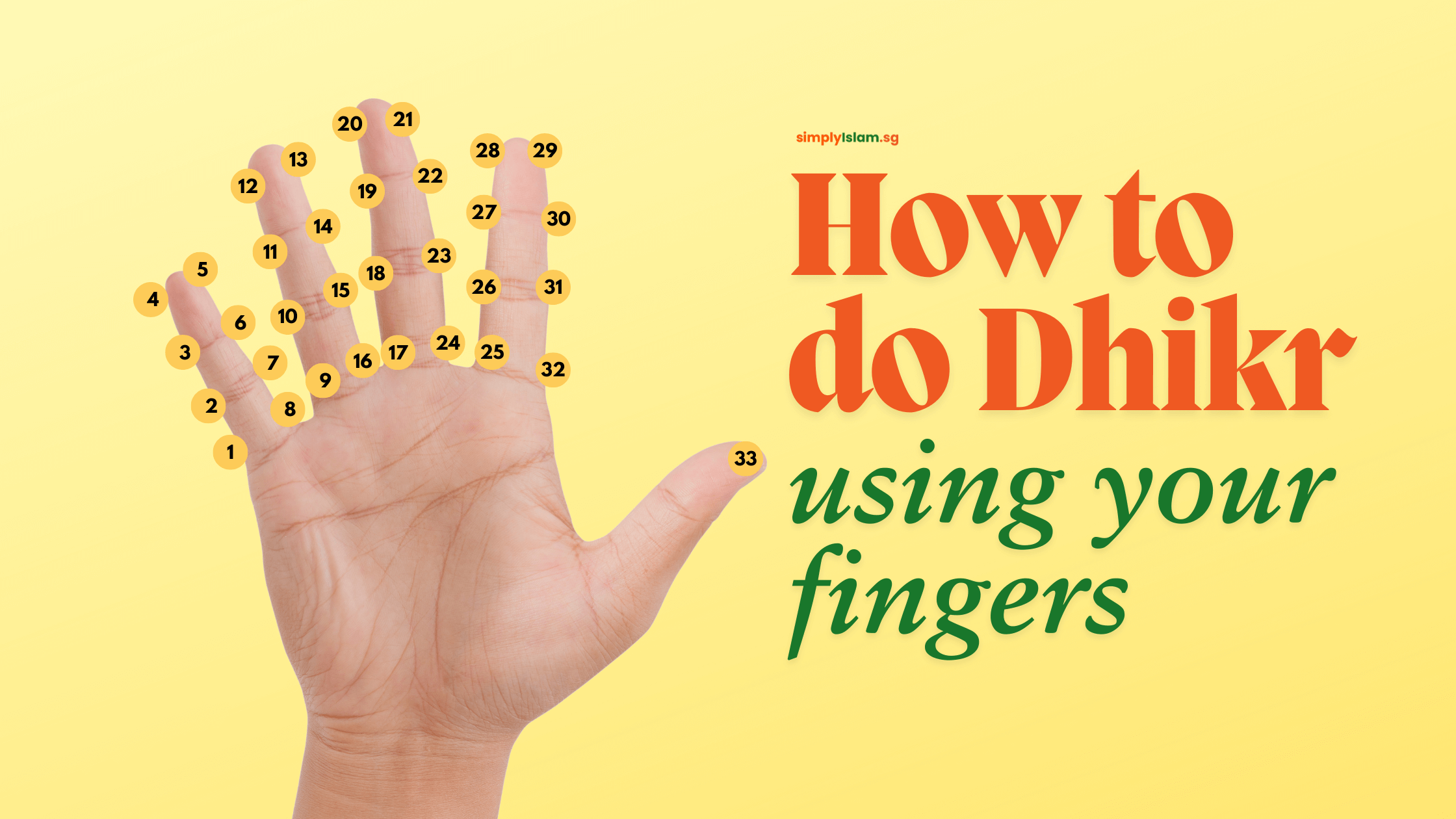
Glorifying Allah Using the Fingers
Abdullah Ibn Amr Ibn Al-'As, (May Allah be pleased with him and his father) said: ' I saw the Messenger of Allah (Peace and Blessings be upon him) count [instances of] praises using his right hand [fingers]'. [Abu Dawood]
Azkaar of the Morning and Evening
Remembering Allah the Merciful in the beginning and end of the day carries great reward. Allah the Merciful mentions in the Qur’an:
يا أَيُّهَا الَّذينَ آمَنُوا اذكُرُوا اللَّهَ ذِكرًا كَثيرًا وَسَبِّحوهُ بُكرَةً وَأَصيلًا
“Believers, remember God often and glorify Him morning and evening.” [33:41-42]
Allah the Merciful also says in the Qur’an:
وَاستَغفِر لِذَنبِكَ وَسَبِّح بِحَمدِ رَبِّكَ بِالعَشِيِّ وَالإِبكارِ
Try Our Best-Selling Courses
Following are some Azkaar duas mentioned in the Sunnah:
Uthman Ibn 'Affan (May Allah be pleased with him) said that Messenger of Allah (Peace and blessings be upon him) said: 'Whenever a servant says every morning and every evening:
[bismiAllahi l-ladhi la yadhurru ma 'a S-mihi shay 'un fi l- 'ardi wa lafi s-sama 'i wa huwa s-Sami'u l-'Alim. Translation: In the name of Allah with whose Name nothing harms in the Earth or in heaven and He is the All-Hearing the All-Knowing] three times, nothing will harm him'. [Tirmidhi]
Shaddad Ibn Aws (May Allah be pleased with him) said that the Messenger of Allah (Peace and Blessings be upon him) said: 'The master of invocations for forgiveness is to say:
[AIIahumma anta Rabbi la ilaha illa anta, khalaqtani wa ana 'abduka, wa ana 'ala 'ahdika wawa 'dika mas-tata 'tu, a'udhubika min sharri ma sana 'tu, abu 'u laka bini'matika 'alayya, wa abu 'u laka bidhanbi fagh-fir Ii, fa innahu la yaghfiru dh-dhunuba illa anta. Translation: O Allah! You are my Lord! There is no god but You. You have created me and I am your servant, and I am sincere to my pledge and my promise [to you] as much as I can. I seek refuge in you from all that is evil of what I have done. I acknowledge before you all the blessings you have bestowed on me, and I confess to You all my sins. So I entreat you to forgive me for no one forgives sins except for You]. Whoever says it with conviction in the morning and dies that day before the sun sets then he is one of the people of Paradise. Whoever says it with conviction at night and dies before the sun rises then he is one of the people of Paradise'. [Bukhari]
Umm Salamah, (May Allah be pleased with her), narrated that the Prophet (Peace and Blessings be upon him) used to say immediately on completion of al-Fajr prayer:
[Allahumma inni as 'aluka 'ilman nafi'an, wa rizqan [ayyiban, wa 'amalan mutaqabbalan.
Translation: O Allah! I pray to You for useful knowledge, good provision and deeds that are accepted]. [Ahmad]
Dhikr is the single most important element that helps a Muslim remember Allah the Merciful at all times. It is the key to all that is good for the servant both in this life and in the Hereafter. Allah the Merciful says in the Qur’an:
وَلا تَكونوا كَالَّذينَ نَسُوا اللَّهَ فَأَنساهُم أَنفُسَهُم ۚ أُولٰئِكَ هُمُ الفاسِقونَ لا يَستَوي أَصحابُ النّارِ وَأَصحابُ الجَنَّةِ ۚ أَصحابُ الجَنَّةِ هُمُ الفائِزونَ
“Do not be like those who forget God, so God causes them to forget their own souls: they are the rebellious ones there is no comparison between the inhabitants of the Fire and the inhabitants of Paradise” [59:19-20]
In short, remembering Allah the Merciful is one of the virtuous acts of worship through which one can achieve tranquility, rest and peace of mind and heart. May Allah give us the strength to do Dhikr regularly. Ameen!
Also read to know about the complete wird Al-Latif.
FAQs
What is the purpose of dhikr?
The purpose of dhikr is to remember Allah Almighty, glorify His name, and maintain a close spiritual connection with Him by praising Him. It serves to purify the heart, bring inner peace, and strengthen faith by keeping the believer constantly mindful of Allah's Divine Presence. Engaging in dhikr requires focus, mindfulness and attention.
Can you do dhikr on behalf of someone?
While you can pray for others through making du’a, dhikr is generally a personal act of worship performed by the individual to connect with Allah Almighty.
Is dhikr allowed in islam?
Not only it is allowed, but dhikr is highly encouraged in Islam. There are many Quranic verses and Hadith that emphasises the importance and merits of remembering Allah Almighty.
How did the prophet do dhikr?
The Prophet Muhammad (ﷺ) engaged in dhikr frequently, glorifying Allah through phrases like "SubhanAllah" (Glory be to Allah), "Alhamdulillah" (Praise be to Allah), and "Allahu Akbar" (Allah is the Greatest). He also recited Quranic verses, made dua, and remembered Allah during his daily activities.
What to say after prayer...33 times?
Recitations after prayer is called ‘wird’. After completing ones prayers, it is Sunnah to say "SubhanAllah" 33 times, "Alhamdulillah" 33 times, and "Allahu Akbar" 34 times.
Can I do dhikr anytime?
Yes, dhikr can be performed at any time and in almost any state, whether walking, sitting, or lying down. You do not need to be in a state of wudhu’ to recite it, making it easier for you to recite dhikr anytime, anywhere.
How to perform dhikr on hands?
Performing dhikr on your hands can be done by counting with your fingers. Traditionally, Muslims use their right hand, starting with the little finger, moving sequentially to each finger joint until you reach the thumb. This practice is Sunnah, as the Prophet Muhammad (ﷺ) counted dhikr on his fingers.
Final Thoughts on How to do Dhikr
Dhikr, the remembrance of Allah Almighty, is a profound act of worship that nurtures the soul and deepens our connection with the Divine.
Its importance lies in its ability to purify the heart, bring tranquility, and keep us mindful of Allah in every moment of our lives. Understanding how to do dhikr allows us to perform this act of worship meaningfully, whether through reciting Quranic verses, supplications, or praising Allah with phrases like "SubhanAllah," "Alhamdulillah," and "Allahu Akbar."
Incorporating *adhkar* in the morning and evening, as prescribed in the Sunnah, adds structure and consistency to our spiritual routine, ensuring that our day begins and ends with the remembrance of Allah. By making dhikr a regular practice, we open our hearts to its transformative power and draw closer to Allah Almighty.
Subscribe to Our Newsletter
Stay updated on our free courses, promotions, events and more!
Thank you!
Related Courses
About The Author:
Written By:
Fatima Sajid
Fatima Bint Sajid is a young aspiring student of Medicine from Karachi, Pakistan. She has been a learner of religion for the past 7 years and carries a Diploma degree in Arabic Language along with a graduate degree in Islamic Studies from Princess Noura Bint Abdul Rehman University, Saudi Arabia. She is a certified international public speaker and speaks 3 languages with fluency. She loves reading and writing in her free time. Her love and passion for writing gives her no boundaries in creativity and exceptional language style. She is currently working as a freelance content writer in SimplyIslam Academy and SimplyArabic Academy.
About Us
SimplyIslam Academy, a subsidiary of SimplyIslam.sg, is an online Islamic education centre, delivering quality Islamic courses via online since early 2021.
The online Islamic school provides indispensable learning on the various sciences of Islam, covering Qur’an, Hadith, Sirah, Fiqh, Tasawwuf, and others.
The online Islamic school provides indispensable learning on the various sciences of Islam, covering Qur’an, Hadith, Sirah, Fiqh, Tasawwuf, and others.
Follow us
Useful Links:
Thank you!

Learn Anytime, Anywhere
Copyright © SimplyIslam Academy. All Rights Reserved.
Try Our Free Online Islamic Classes Today
Enter your email and we’ll send you notifications on our free classes.
Thank you for subscribing to our newsletter!
Try Our Free Online Islamic Classes Today
Enter your email and we’ll send you notifications on our free classes.
Thank you for subscribing to our newsletter!
